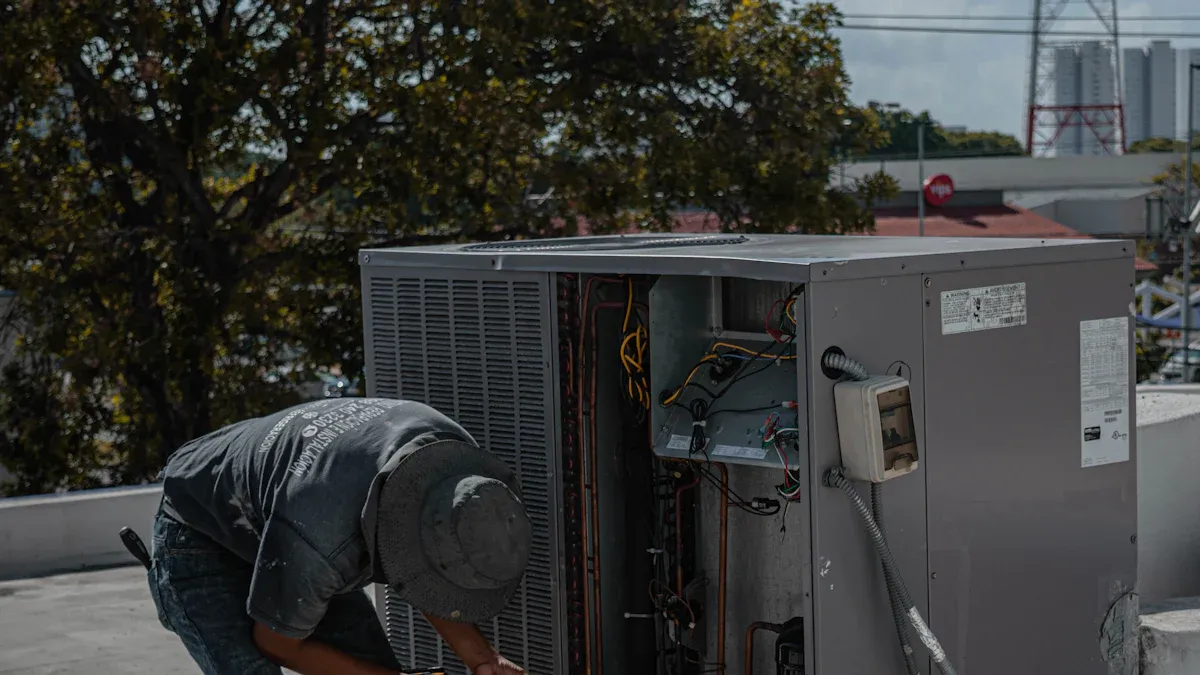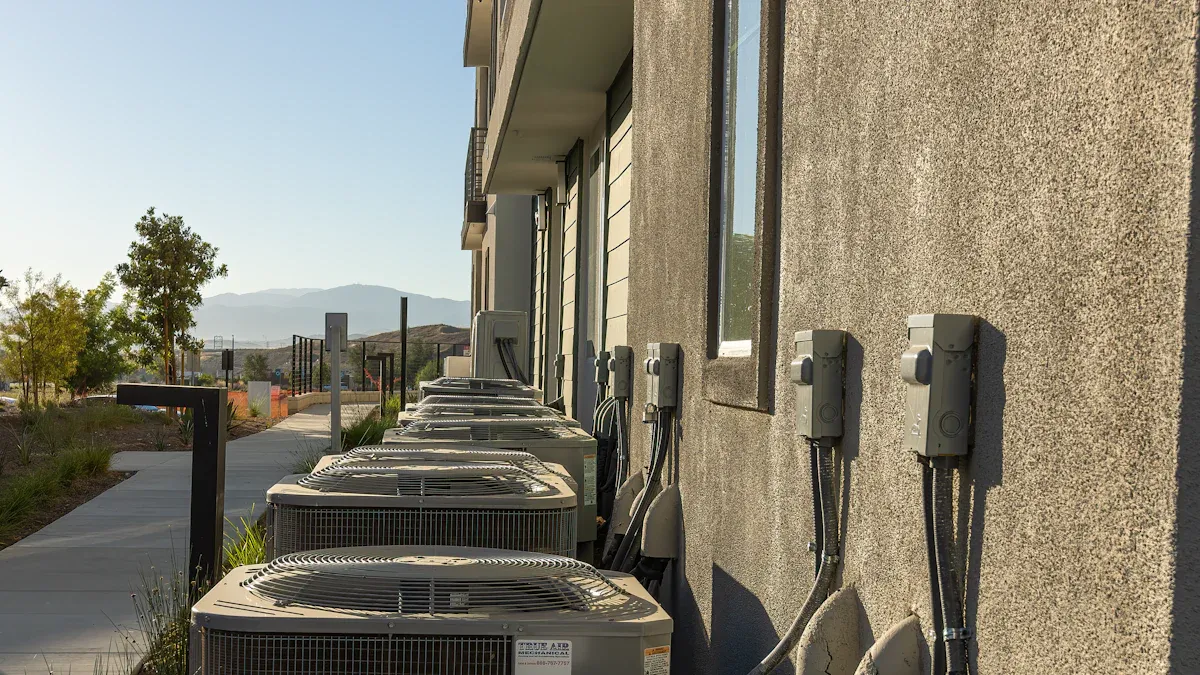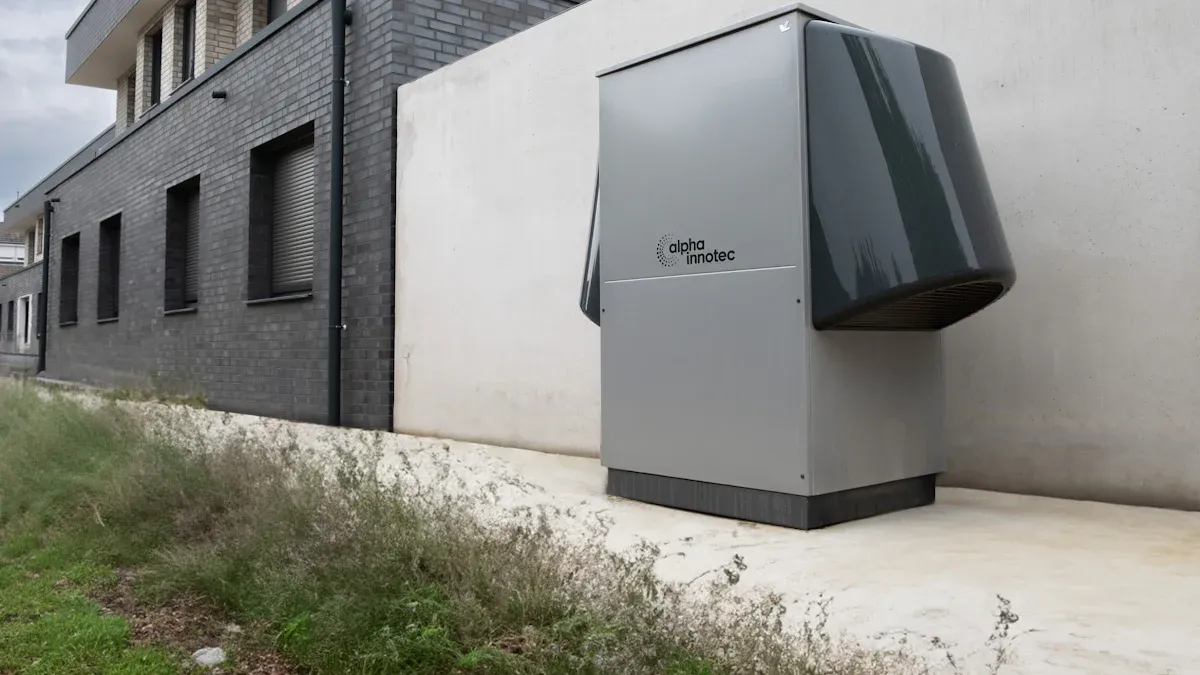The Role of AC in Outdoor Telecom Cabinet Protection

Outdoor telecom cabinets with AC are essential for housing delicate equipment that powers modern communication networks. These cabinets are constantly exposed to harsh weather conditions, including heat, moisture, and airborne dirt, which can cause significant damage. Without proper protection, equipment inside an outdoor telecom cabinet with AC can overheat, corrode, or fail, leading to costly repairs and network disruptions.
To address these challenges, maintaining the right climate inside the cabinet is crucial. An outdoor telecom cabinet with AC ensures a stable internal temperature, allowing the equipment to function optimally even in adverse weather conditions. Industry standards also emphasize the importance of durable outdoor telecom cabinets with AC to safeguard critical communication systems effectively.
Key Takeaways
Air conditioners keep outdoor telecom cabinets cool, avoiding overheating.
They control humidity to stop rust and protect electronics.
Cleaning and changing filters often makes air conditioners work better.
Picking the right size and energy-saving air conditioner is important.
Watching air conditioner performance helps fix problems before they get worse.
Environmental Challenges for Outdoor Telecom Cabinets

Outdoor telecom cabinets face tough weather conditions all the time. These problems can harm the equipment and shorten its life. Knowing these risks helps you protect your telecom systems better.
High Temperatures and Heat Load
Heat is a big problem for outdoor telecom cabinets. Hot weather makes the equipment inside even hotter, causing overheating. Overheating can break delicate parts and make them work poorly. Long exposure to hot weather, like summer heat, wears out your equipment faster.
Cooling systems, like air conditioners, fix this issue. They keep the inside temperature safe for the equipment. A stable temperature helps your telecom hardware last longer and avoids expensive breakdowns.
Moisture and Humidity Risks
Humidity is another problem for outdoor telecom cabinets. Water can get inside and cause rust or short circuits. High humidity also leads to mold and mildew, which block airflow and harm parts. Without controlling moisture, your equipment can easily get damaged.
Air conditioners with dehumidifiers solve this problem. They remove extra moisture, keeping the inside dry and safe. Good sealing and insulation also help stop water from getting in, protecting your equipment from bad weather.
Dust and Contaminant Intrusion
Dust and dirt are common outside and can enter telecom cabinets. They sneak in through vents or gaps and settle on the equipment. This buildup can slow performance, block cooling systems, and cause overheating.
Air conditioners with filters can stop this issue. Filters catch dust and dirt, keeping the cabinet clean inside. Cleaning filters and checking seals often keeps your equipment safe from harmful particles.
Benefits of Using an Outdoor Telecom Cabinet Air Conditioner

Outdoor telecom cabinet air conditioners help protect important electronic equipment. They manage temperature, humidity, and dust to keep systems working well. Here are the main benefits of using these air conditioners.
Temperature Control for Longer Equipment Life
Keeping the right temperature inside the cabinet is very important. High heat can make equipment overheat, break, or work poorly. Air conditioners cool the cabinet, keeping the temperature safe for the equipment.
Studies show that controlling temperature helps equipment last longer. Too much heat can harm delicate parts, but cooling prevents this. For example, smart cooling systems save energy and stop overheating. They use data to adjust settings for better performance and lower costs.
Using an outdoor telecom cabinet air conditioner protects your equipment from heat damage. It also helps your systems last longer and work better.
Humidity Management to Stop Rust
Humidity can harm electronic equipment by causing water buildup. This leads to rust and damages sensitive parts. Without controlling moisture, water damage can ruin your systems.
Air conditioners with dehumidifiers keep the cabinet dry. They lower humidity levels to stop water from forming and causing rust. Research shows that controlling moisture stops rust by blocking harmful reactions on metal parts. This keeps your equipment safe from water problems.
An outdoor telecom cabinet air conditioner protects your equipment from rust. It ensures your systems work well even in wet conditions.
Dust Protection for Cleaner Equipment
Dust can get inside cabinets and harm equipment. It blocks airflow, causes overheating, and lowers system performance. Over time, this can shorten the life of your equipment.
Air conditioners with filters catch dust and keep the cabinet clean. Cleaning or replacing filters regularly helps the cooling system work well. Cabinets with good seals also stop dust from getting inside, creating a safe space for your equipment.
Cleaner conditions improve energy use and help equipment last longer. Cooling and dust protection together keep your systems running smoothly and protect your investment.
Choosing the Right Outdoor Telecom Cabinet with AC
Picking the right outdoor telecom cabinet with AC is important. It protects your equipment and keeps it working well. Think about cabinet size, weather, and energy use to decide.
Checking Cabinet Size and Heat Load
The cabinet's size affects how well it cools. A small cabinet may not cool enough. A big one might waste energy. To pick the right size, check the heat your equipment makes. Heat load means how much heat your devices create while working. This helps you choose an AC system that cools properly.
For instance, studies like "Cooling Systems for IT Environment Heat Removal in (Internet) Data Centers" show why matching cooling to heat is key. Knowing your equipment's heat helps stop overheating and keeps it lasting longer.
Thinking About Local Weather
Your area's weather affects how the cabinet works. Hot and wet places need systems for heat and moisture. Dusty areas need cabinets with strong filters.
Research like "Investigation on the energy and air distribution efficiency with improved data centre cooling to support high-density servers" shows cooling must fit the weather. By knowing your area's climate, you can pick a cabinet that protects all year.
Looking at Energy Use and Costs
Energy-saving cabinets are better for long-term use. They use less power and cost less to run. Look for features like smart cooling or variable-speed compressors. These adjust cooling based on what’s needed, saving energy.
The study "Strategies in Energy Conservation and Management of Heating, Ventilating and Air-Conditioning (HVAC) System of a Data Center" highlights energy-efficient designs. Choosing advanced cooling saves money and helps the environment too.
Best Practices for Maintaining Outdoor Climate Control Systems
Regular Cleaning and Filter Replacement
Keeping the air conditioner clean helps it work better. Dirty filters block airflow and make the system work harder. This uses more energy and wears out equipment faster. Experts suggest checking filters every month. Replace them every 1 to 3 months, especially in dusty areas. Cleaning coils and condensers often also keeps cooling strong.
Tip: Regular maintenance can cut energy use by 5 to 20 percent yearly. It also makes your air conditioner last longer, saving you money.
By cleaning and replacing filters regularly, you keep your telecom equipment safe and avoid sudden problems.
Scheduled Inspections and Preventive Maintenance
Regular inspections help find small problems before they get worse. Scheduling maintenance ensures all parts of the system work well. This includes checking for damage, testing cooling, and preparing for weather changes.
Inspections find early issues like worn seals or clogged filters.
Seasonal checks, like testing cooling before summer, prevent breakdowns during hot months.
Fixing moisture problems during checks stops rust and electrical damage.
Preventive maintenance keeps the system working smoothly and avoids downtime. It also helps you plan repairs or upgrades ahead of time.
Monitoring Performance and Addressing Issues
Watching how the air conditioner works helps spot problems early. Look for warning signs like strange noises, weak cooling, or higher energy bills. These might mean leaks or broken parts.
Use tools to check temperature and humidity inside the cabinet. Fix any issues quickly if you see something wrong. Ignoring small problems can lead to bigger, costly failures.
Note: Regular monitoring keeps the system working well and saves energy, lowering costs over time.
By staying alert, you can keep your climate control system reliable and protect your telecom equipment.
Outdoor telecom cabinets need strong climate control systems to keep equipment safe. Air conditioning systems create stable conditions, helping devices work well and last longer.
Tip: Pick an air conditioner that fits your cabinet size and weather. Regular care keeps it working well and stops expensive fixes.
Choosing the right cooling system and following good habits protects your telecom setup and prevents downtime.
FAQ
Why is an air conditioner needed in an outdoor telecom cabinet?
An air conditioner keeps the cabinet cool inside. It stops overheating, lowers moisture, and blocks dust. This helps your telecom equipment work well and last longer, even in tough weather.
How often should air conditioner filters be changed?
Check filters every month and change them every 1 to 3 months. In dusty areas, you might need to change them more often. Clean filters help airflow and cooling, keeping your equipment safe.
Can an air conditioner stop rust inside the cabinet?
Yes, air conditioners with dehumidifiers lower moisture inside. By reducing humidity, they stop water from causing rust. This protects your equipment in wet or humid places.
How do you pick the right air conditioner for your cabinet?
Think about the cabinet size, heat, and local weather. Match the cooling power to your equipment's heat. Choose energy-saving models with smart cooling to save money.
What are signs that an air conditioner is not working?
Look for weak cooling, strange sounds, or higher energy bills. These could mean leaks, clogged filters, or broken parts. Fixing these quickly avoids big problems and keeps your equipment safe.
See Also
Safeguarding Equipment Using Outdoor Telecom Cabinets Effectively
Exploring Outdoor Communication Cabinets and Their Telecom Importance
Essential Materials Needed for Outdoor Telecom Cabinets
Key Factors for Ensuring Longevity of Telecom Cabinets
Specifications for Outdoor Telecom Cabinets Supporting Communication Gear
CALL US DIRECTLY
86-13752765943
3A-8, SHUIWAN 1979 SQUARE (PHASE II), NO.111, TAIZI ROAD,SHUIWAN COMMUNITY, ZHAOSHANG STREET, NANSHAN DISTRICT, SHENZHEN, GUANGDONG, CHINA
